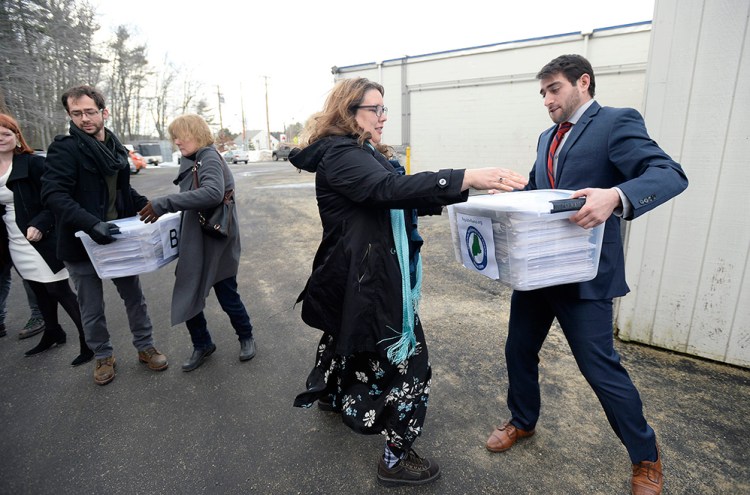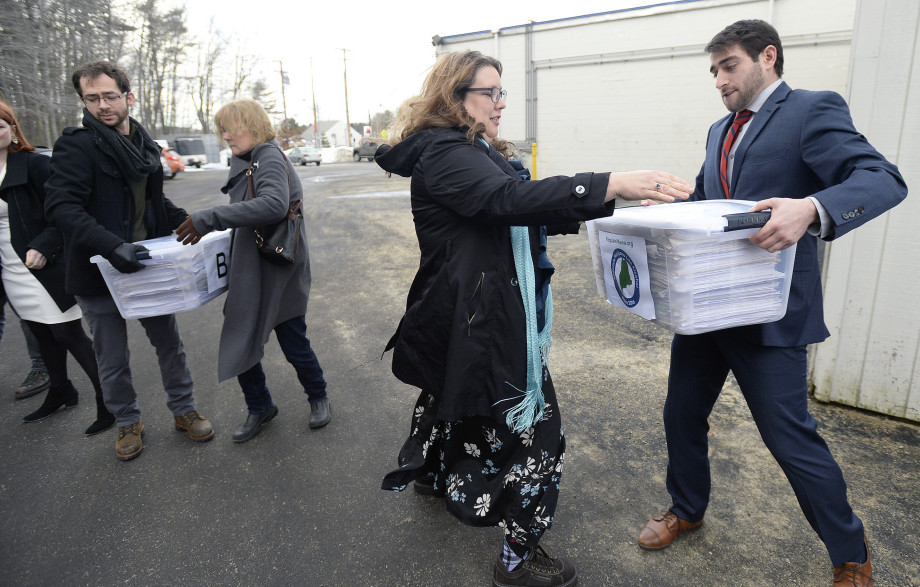Petitions calling for the legalization of recreational marijuana use in Maine were delivered to state officials Monday, setting the stage for a public debate on whether Maine should become one of the growing number of states to relax prohibitions against the drug.
But the effort met with criticism from medical marijuana growers and patients, who staged a small but loud protest when the petitions arrived at the Secretary of State’s Office in Augusta. The protesters said the referendum would put marijuana in the hands of big business and destroy the local industry that has sprung up around medicinal uses of the drug.
The Campaign to Regulate Marijuana Like Alcohol, which backs a bill that would allow adults 21 and older to possess marijuana, collected 103,115 signatures in its quest to make Maine the first East Coast state to legalize pot for recreational use. The campaign needs 61,123 valid signatures to qualify for the November ballot.
Rep. Diane Russell, D-Portland, who has sponsored multiple marijuana legalization bills in the Legislature in the past five years, said it is both unusual and exciting to see a campaign collect more than 100,000 signatures. Organizers and volunteers from the campaign stopped counting at just over 103,000, she said.
In a news conference Monday morning at the campaign headquarters in Falmouth, Russell said the amount of support during the signature campaign shows that Mainers are ready to bring marijuana “out of the shadows and out of the black market.” She chided the Legislature for not taking the initiative to craft a bill to send to voters, but praised the state’s long-standing medical marijuana program.
“It tells people we were right all along,” she said. “Maine people really do want a rational policy around drug use. Maine has proven we can regulate marijuana responsibly.”
The proposal would allow adults to possess up to 2½ ounces of marijuana and to cultivate a limited number of plants. Adults would be prohibited from using marijuana in public, with violations punished by a $100 fine. The bill also would apply a sales tax of 10 percent to retail marijuana and marijuana products.
The push for a legalization vote began with two competing measures last year, but the campaigns backing them united behind one proposal in October to avoid confusion and a division of the vote. Campaign manager David Boyer of the Marijuana Policy Project said the confusion seemed to dissipate once the campaigns merged.
LOUD PROTEST AND ACCUSATIONS
But the merger left lingering tensions that were evident Monday when the protesters shouted insults as Boyer, Russell and others unloaded a U-Haul truck loaded with petitions outside the state office building in Augusta. One man using a mini-bullhorn called Boyer a “scumbag” and challenged him to a debate. Others used more colorful vulgarities.
Some protesters also claimed betrayal by Paul McCarrier, a longtime medicinal marijuana advocate who had led the second legalization campaign before the two drives merged, and who previously had a contentious relationship with Boyer.
Karl Stebbins, a grower, accused McCarrier of allowing the Washington, D.C.-based Marijuana Policy Project to co-opt the Maine-based campaign. Glenn Lewis, another grower protesting the campaign, said local growers and patients could be hurt if the referendum passes.
“The growers that take care of people are small growers,” he said. “We have a cottage industry throughout the state and we want to be able to share that rather than have a big corporate model.”
He added: “It saddens me that we’re here to not legalize. … It just kills me that we have to do this. It only makes sense to do this and save an industry that has belonged to us for a very long time. We don’t want to give this away. We’ve given everything away.”
Will Neils, another protester, said legalization laws in other states have hurt the medical marijuana industries there. He said the referendum will “commodify” the needs of patients.
“We have patients who fled and moved thousands of miles to move here,” Neils said. “That’s because the citizens in the medicinal marijuana community participate, we come to the Legislature and we craft the laws and we work with the Health and Human Services Committee. We’ve done that for six years now.”
PROPONENTS DEFEND STRATEGY
Boyer said the referendum question would not alter the medical marijuana program. “In fact, it gives preference to those involved in the medical marijuana industry right now of going into the adult-use market,” he said.
Russell said she was dismayed by the insults from critics, but noted that legalization supporters expected opposition. “We fundamentally believe that what we’re doing is the right thing,” she said. “This is a moral and just issue.”
The proposal also faces opposition from Smart Approaches to Marijuana Maine, which worked to defeat campaigns to legalize recreational marijuana in South Portland and Lewiston in 2014. Scott Gagnon, the group’s leader, said Maine should not be legalizing another drug in the midst of an opiate addiction crisis. He said legalization increases marijuana use by teenagers.
Send questions/comments to the editors.





Success. Please wait for the page to reload. If the page does not reload within 5 seconds, please refresh the page.
Enter your email and password to access comments.
Hi, to comment on stories you must . This profile is in addition to your subscription and website login.
Already have a commenting profile? .
Invalid username/password.
Please check your email to confirm and complete your registration.
Only subscribers are eligible to post comments. Please subscribe or login first for digital access. Here’s why.
Use the form below to reset your password. When you've submitted your account email, we will send an email with a reset code.